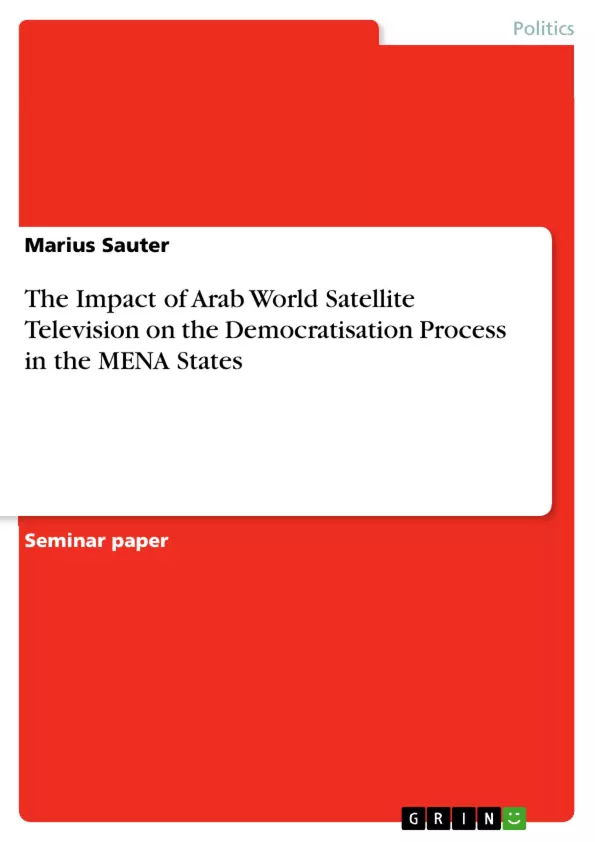The Arab world is considered to be currently undergoing a great change. A new generation of leaders (for example Bashar al-Asad in Syria, Absallah II. in Jordan, Hamad bin Isa in Bahrain) has to face the urgency of social, political and economic reforms, which have been retarded for a long time. Yet despite a perceivable higher degree of tolerance towards discussion and dissent in some Arab countries, despite the aspired renewal and modernisation of economy and politics in their countries, the young leaders did and do not intend any far reaching change of the political system. Nevertheless a public sphere is awakening in the countries of the Middle East, expressing discontent with the present political situation and claiming more political participation and economic freedom. The kifaya movement in Egypt might be a good example for this course of events, which actually is taking place throughout the Arab world.
Strict media laws have hindered the formation of a vital civil society in the past decades. The rise of private-owned satellite television channels in the past 10 years has raised the hope that these new media will contribute to the evolving democratisation process, which is perceivably taking place throughout the Arab world. Considering the vital role of mass media in consolidated democracies, the question arises, what contribution mass media, especially television channels, can make to the democratisation process in the countries of the Middle East and Northern Africa (MENA States). Television is considered as a very capacious instrument in this process, because illiteracy is still very widespread, thus audiovisual media embody the most accessible source of information for large parts of the population.
Precise and capacious data about viewing habits is hardly available and the few statistics that exist cannot claim full validity and aren’t sufficient to confirm a comprehensive theory. As Kai HAFEZ, an expert in Arab media, put this problem: “Whereof is the function of the New Media in the context of political transformation to be measured?” Are there links between television programming and democratisation? What impact does satellite television in particular have on this process? To what extent and under what conditions can satellite television channels contribute to the democratisation process? Are media freedoms necessary prerequisites for a democratic transition or do these freedoms evolve during the democratisation process?
Inhaltsverzeichnis (Table of Contents)
- Introduction
- The role of mass media
- Television in the Arab World
Zielsetzung und Themenschwerpunkte (Objectives and Key Themes)
This essay examines the impact of Arab World satellite television on the democratisation process in the MENA States. The goal is to understand the potential contribution of these new media in shaping a more open and participatory political landscape.
- The functions of mass media in consolidated democracies and underdeveloped countries
- The characteristics of Arab television channels and the challenges in the Arab media landscape
- The development of television broadcasting in the Arab World and the potential for its connection to civil society
- The potential of satellite television to contribute to democratisation in the Arab World
Zusammenfassung der Kapitel (Chapter Summaries)
The introductory chapter presents the background and context of the essay, discussing the current state of democratisation in the Arab world and the significance of mass media in the process.
The second chapter explores the roles of mass media in consolidated democracies and underdeveloped countries, highlighting the importance of free and pluralistic media for a democratic society. The specific challenges faced by Arab media in this context are also addressed.
The final chapter delves into the history and characteristics of Arab television channels, focusing on the development of satellite television and its impact on the media landscape. The chapter also examines the potential for bridging the gap between Arab media and civil society in the MENA States.
Schlüsselwörter (Keywords)
The key terms and concepts examined in this essay include democratisation, mass media, Arab television, satellite television, civil society, media freedom, and the Arab World.
Frequently Asked Questions
Why is television so important for democratization in the Arab world?
Due to widespread illiteracy in some parts of the MENA region, audiovisual media like television are the most accessible and influential sources of information for large segments of the population.
What role does satellite television play in the MENA states?
Private satellite channels provide a platform for discussion and dissent that was previously suppressed by strict state media laws, helping to awaken a new public sphere.
What is the "kifaya" movement?
The kifaya movement in Egypt is a prominent example of a civil society movement claiming more political participation and economic freedom in the Arab world.
Are media freedoms a prerequisite for democratic transition?
This is a central debate: whether media freedom must exist before democratization can occur, or if these freedoms naturally evolve during the process of political change.
Who are some of the "new generation" leaders mentioned?
The paper mentions leaders like Bashar al-Asad (Syria), Abdallah II (Jordan), and Hamad bin Isa (Bahrain), who faced the urgency of social and political reforms.
- Arbeit zitieren
- Marius Sauter (Autor:in), 2006, The Impact of Arab World Satellite Television on the Democratisation Process in the MENA States, München, GRIN Verlag, https://www.grin.com/document/57550



